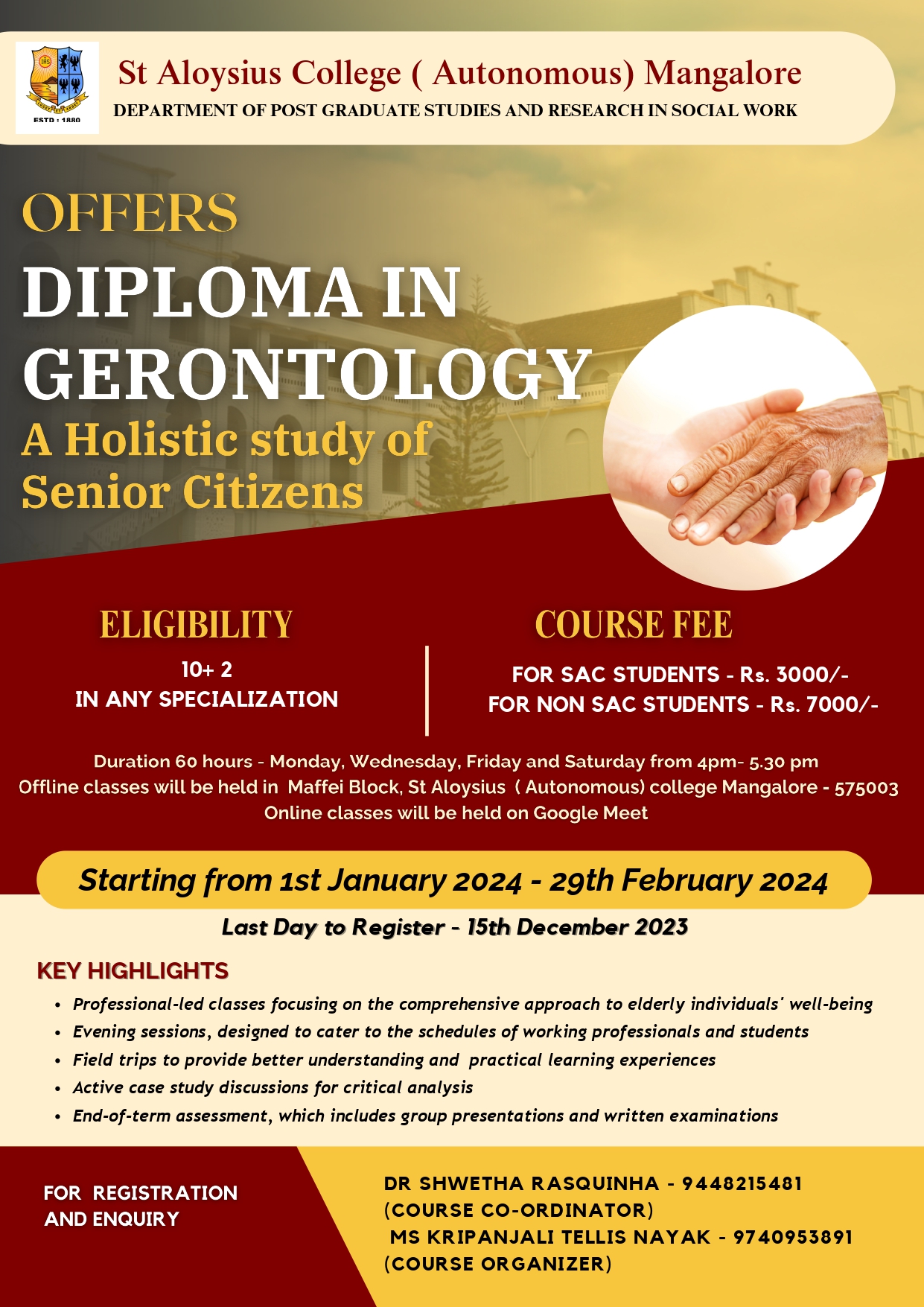DIPLOMA IN GERONTOLOGY – SAC Students

About Course
Vision
Gerontology is the multidisciplinary study of the aging process, encompassing various aspects such as biology, psychology, sociology, healthcare, policy, and more. With the global population aging rapidly, there is an increasing need for individuals who understand the complexities of aging to address the challenges and opportunities associated with an aging society. This project proposal outlines the creation of a comprehensive Gerontology course for undergraduate students
Objectives
- To provide students with a solid foundation in the field of Gerontology.
- To introduce students to the biological, psychological, and social aspects of aging.
- To foster critical thinking and research skills in the context of gerontological studies.
- To prepare students for careers in fields related to aging, such as healthcare, social work, policy, and research.
INTRODUCTION
Gerontology vs. Geriatrics: What’s the Difference?
Gerontology is a broad, multidisciplinary field that investigates aging throughout the human lifespan. Geriatrics is a medical specialty focusing on caring for the unique health needs of older adults. Physicians, nurses and other health professionals can specialize in geriatrics.
What Does a Geriatrician Do? Geriatricians are doctors with specialized training in the aging process, including preventing, diagnosing and treating illness in older adults. They practice in many different settings, from homes to long-term care environments, hospitals and private practice clinics.
Should I Study Gerontology to Become a Geriatrician? Studying gerontology provides a solid foundation for a career in geriatrics. For instance, aspiring geriatricians might earn a gerontology degree before attending medical school.
Designing a 2-month, 60-hour program for Gerontology requires a well-structured curriculum that covers the essential topics in the field. Gerontology is the multidisciplinary study of aging and the elderly population, so the program should incorporate various aspects such as healthcare, psychology, social issues, and more.
SCOPE
Work and Employment
Gerontology is a growing and upcoming field—Careers in Ageing are going to be among the next big things in the 21st Century workforce, thus, after graduating the Course participants will be able to some professionals work directly with older persons.
Benefacting Focus Groups:
- Healthcare Professionals: .
- Caregivers:
- Family Members:
- Social Workers: .
- Aging Services Professionals:
- Members of the Religious Communities:
- Seniors Themselves:
- Researchers and Students:
- Those Exploring Career Opportunities
Their activities may include:
- Developing programmes for older persons
- Counselling older persons and their families about issues of caregiving, employment, death and dying, or mental health.
- Advising older clients about estate planning and investments, financing long-term care, or housing options.
- Conducting research on the ageing processes and diseases associated with ageing
- Analysing issues related to older persons .
- Planning, administering, and evaluating community-based services
- Teaching courses on ageing to college and university students, health care professionals, and older adults.
- Advocating with or on behalf of older persons
- Designing products to meet the special interests and needs of older persons.
- Advising business, industry, and labour regarding older workers and consumers.
CURRICULUM
Week 1-2: Introduction to Gerontology (14 hours)
Week 1-2 : Overview of Gerontology (2 hours)
Introduction to the field of Gerontology.
Historical perspectives and contemporary relevance.
Relevance of the study of gerontology.
Week 1-2: Biological and Physical changes in Aging (12hours)
The aging process at the cellular and physiological levels.
Concept of Healthy Ageing; Distinction between Normal and Pathological Patterns of Ageing, Factors affecting Healthy Ageing.;
Productive Ageing: optimal utilisation of potential and resources.
Week 3-4:PsychoSocial and Environmental Aspects of Aging (14 hours)
Week 3: Social Gerontology (7 hours)
Cognitive changes and psychological aspects of aging.
Social challenges and opportunities in an aging society.
Family dynamics and caregiving.
Week 4: Aging in Place and Housing (Aging Interventions) (7 hours)
Housing options and their implications for older adults.
Community resources and support systems.
Occupational therapy and Financial viabilities of older citizens.
Nature and Scope of Collective Action;
Types of Collective Action (Groups, intra- and inter-Community mobilisation);
Week 5-6: Health and Healthcare in Aging (14 hours)
Week 5: Healthcare and Wellness (7 hours)
Common health issues in older adults.
Preventive healthcare measures.
Lifespan Perspective on Human Development:
Skills for Working with Older Adults:
Skills for Work with Caregivers
Week 6: Long-Term Care and Services and care of older adults with special needs (7 hours)
Types of long-term care facilities.
Legal and financial considerations in long-term care.
Ethical issues in elder care.
Palliative care and end-of-life issues.
Elder Abuse:
Week 7- 8 Policy in Gerontology and Conclusion (18hours)
Week 7: Gerontological Policy and Advocacy ( 4 hours)
Government policies and their impact on the elderly population.
Advocacy and lobbying for senior citizens.
Ethical considerations in policy development.
Society’s responsibility towards older citizens
Constitutional provisions and policies for Older Adults in India:
Ethics of Gerontology.
Welfare Schemes; Shelter and Housing;
Safety & Security – Police, FIR, Legal aid
Program Evaluation and Conclusion (12 hours)
Week 8: Student Presentations and Final Assessment (14 hours)
Students present their understanding and insights.
A final assessment to evaluate knowledge retention.
Assignments, readings, and projects.
Field Visits
ASSIGNMENTS :
- Report on field visit.
- Governement schemes for Senior Citizens
Course Content
Introduction
Student Ratings & Reviews
